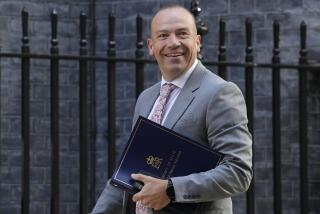A Year, No Reforms : Ulster Accord Survives--if in Fragile Form
- Share via
BELFAST, Northern Ireland — By all normal standards, the far-reaching agreement signed a year ago Friday by Britain and the Irish Republic in an effort to reduce tension in troubled Northern Ireland should be written off as a failure.
The accord, supported by $50 million in U.S. funds, was designed to halt the sectarian killing and intimidation that has taken 2,500 lives and warped daily life over the last 17 years. That American money was given to help improve the economically strapped province’s economy. Nonetheless, the levels of violence and intimidation have risen.
The Anglo-Irish agreement was also intended to coax Protestant leaders into talks on sharing political power with a Roman Catholic minority they have dominated for most of the past four centuries. But there have been no such talks, and none seem likely soon.
And it was designed to usher in reforms that would give Catholics greater confidence and a sense of having a stake in the political process. However, no reforms have been carried out--not even a symbolic, much-discussed removal of the ban on flying the Irish tricolor here in the British province known as Ulster.
Not the Usual Standards
Yet, normal standards of success do not apply in this puzzling, Connecticut-sized corner of Europe. Measuring progress in resolving the religious wars that Christians elsewhere in Europe resolved centuries ago requires a different yardstick.
The very fact that the machinery for implementing the Anglo-Irish agreement has survived a year of Protestant protest, and that both Britain and the Irish Republic remain strongly committed to its principles, constitutes a modest yet significant measure of success.
“There is absolute determination that this agreement will continue to be implemented,” said Nicholas Scott, the British minister of state for Northern Ireland, in a Belfast radio interview Friday.
The only other serious attempt to involve the Catholic minority in the political decision-making process in Northern Ireland, in 1974, lasted only seven months before it was destroyed by Protestant militants.
Turbulent History
It was an earlier generation of Ulster Protestants whose vehement protests blocked the six northern Irish counties from becoming part of the Catholic, newly independent republic in 1921.
“Governments before have always buckled to (Protestant) threats, but for the first time ever, we’ve got a framework for the healing process that’s holding,” said John Hume, leader of the moderate Catholic Social Democratic Labor Party and the agreement’s leading proponent. “What’s implicit is that it is going to take a long time.”
When questioned about why the agreement had not produced results, a close aide to Prime Minister Margaret Thatcher responded heatedly, saying: “They’ve been at each other for 400 years, and if you think you can change it all in 12 months, you’re a lunatic. This agreement is a long-term treatment for an ancient disease.”
Just how long it may take for Protestant leaders to begin talking about sharing political power is open to speculation. Estimates range from 18 months to four years.
Political Factor
Many argue that no substantive discussions can begin until after elections in the Irish Republic next year and in Britain some time before June, 1988.
But with the once-unchallenged Protestant political power in Ulster replaced by direct rule from London, and with the agreement providing Dublin a consulting role until Protestants and Catholics can agree on power-sharing, both the British and the Irish governments appear to be content to wait as long as necessary.
So far, there has been no sign of Protestant willingness to enter talks.
Behind rallying cries of “No Surrender,” “Not an Inch” and “Ulster Says No,” Protestant leaders have denounced the agreement as the first step in uniting Ulster to the Irish Republic. They believe this would not only end their political supremacy but destroy their way of life.
Hundreds of Protestant shipyard workers rallied Friday in Belfast, and firebombs were hurled into Catholic homes on the eve of a planned mass rally called by Protestant leaders at City Hall. Late Friday night and early today, one man reportedly died, three policemen were injured and at least 20 youths were arrested in incidents across the province. Groups took to the streets, the feared beginning of a long weekend of protest.
“There is no way the Unionists (Protestants) are going to accept this accord,” said Billy Kennedy of the Protestant daily News Letter Friday. “No way.”
More to Read
Sign up for Essential California
The most important California stories and recommendations in your inbox every morning.
You may occasionally receive promotional content from the Los Angeles Times.










